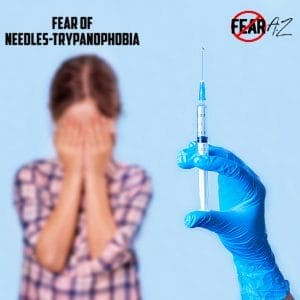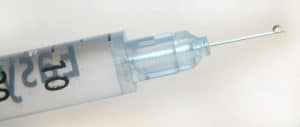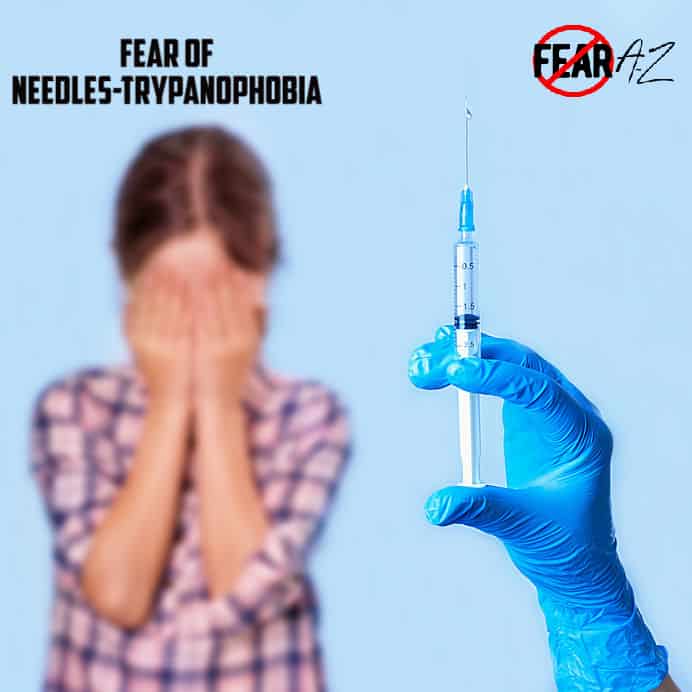Share This Article
Fear of Needles: How to Overcome this Phobia
Are you afraid of needles?
Is getting pierced or stabbed by a sharp and pointy instrument your worst nightmare?
You’re not alone. The fear of needles is very real—and a big frustration for many people.
You know that being terrified of needles is something you want to overcome. You’re tired of screaming or hyperventilating whenever your doctor or dentist is about to insert a needle into your skin or gums. And you realize you can’t avoid injections or medical procedures your entire lifetime. But what can you do?
As much as we hate to accept it, needles are part and parcel of our lives. There will be times you need your shots, for example, to immunize you from a handful of viruses and diseases.
You might be embarrassed that, at your age, you still shake at the sight of a long, glinting needle. Even hearing the word “injection” might cause you to faint. Great news: It’s perfectly normal to think that you might never outgrow your fear, but don’t fret. There is hope at the end of a needle—I mean, the tunnel, as they say.

What Is Trypanophobia?
What is the fear of needles called? Trypanophobia is an intense, debilitating fear of needles—particularly when it’s part of a medical procedure. But if you fear all things sharp and pointy, including pins, your grandma’s scissors, the kitchen knife, or even a harmless little sewing needle, then it is called aichmophobia, belonephobia, or emetophobia. Yes, there are actually three names for this irrational fear.
You probably don’t know why you have this senseless, all-consuming, run-for-your-life fear of needles, but guess what? Doctors also don’t know the cause. But they believe that factors such as past trauma or a negative experience are to blame for your shuddering fear. It could also be inherited or learned. Perhaps someone in your family, maybe your dad or a favorite aunt, suffered from the same fear. Or it could also be brain chemistry.
Finding the Needle in the Haystack of Your Fears
Trypanophobia is usually accompanied by a severe body reaction. When pricked by a needle, your body may trigger a “faint” response to the emotional stress you are undergoing. You might have dizziness or loss of balance right before you faint. When experienced for the first time, this faint response will create a sensitivity towards pain, which will trigger the next time you see or even think of a needle or injection. In very rare cases, you may even experience it in conditions where you are not exposed to a needle or injection.
Trypanophobia is basically seen in children, as they are unused to situations involving injections. This phobia usually goes away as you reach adulthood, but for some, it may intensify.
The Symptoms of Trypanophobia
Every person is unique. Your response to fear may be different from others. At the mere mention of a blood draw, you might suffer from what feels like a heart attack, or you may just burst into tears, howling in despair. Here are phobia symptoms that you might be familiar with—both physical and psychological:
Physical Trypanophobia Symptoms:
- Sweating and/or shaking
- Chest pain
- Dry mouth
- Tachycardia (rapid heartbeat)
- Feeling faint or dizzy
- Elevated blood pressure
- Nausea
- Heavy sweating
- Headache
- Body shakes or shivers
- Difficulty breathing
- Insomnia
Psychological Trypanophobia Symptoms:
- Overwhelming anxiety and stress
- Fear of dying
- Confusion
- Disorientation
- Sense of losing your control
- Inability to relax
- Avoiding medical procedures
- Inability to concentrate
- Panic attacks
- Depression
- Loss of emotional control
Dealing with Trypanophobia
Just as the fear of needles varies, the mode of treatment can also vary with different people. As in the case of other phobias, psychological methods are most effective for the treatment of trypanophobia. But in severe cases, medication is also prescribed in addition to behavioral therapies. Don’t worry, you can ask for needle-free medication options!

Self-Help Techniques
Even if you believe that your fear of needles is a hopeless case, the truth is, it’s not! In fact, the solution to overcoming what you feel to be an unreasonable fear will come from you. We sure wish it would be as easy as flicking a light switch and turning off these fearful sensations, but it takes time and work to get to the path of complete control of your mind and emotions.
Prevention. If you’re ill, try to remember that if you don’t allow a quick needle prick, your condition may worsen—which might require more needles. Just focus on the fact that these sharp objects are here to help you, not harm you.
Winner Mindset. When going to the doctor or dentist, pretend it’s a game and that you’ll come out a winner. This is a surefire way to calm your nerves, especially if you’re the competitive type. Think of the needle as a challenge. If you stay still and don’t become hysterical, you win. Then reward yourself with a treat as your prize. You deserve it!
Relaxation Techniques. Learn breathing exercises, along with utilizing your imagination. Visualize how that needle is way less painful than your cat’s nails digging into your skin, or stubbing your toe, and that you will go through the injection experience perfectly fine.
Get Your Mind Agitated by Something Else. Anger trumps fear. Think of your bitchy colleague, or the time when someone cut into the line at Starbucks, or your high school bully, and work up that anger in the doctor’s clinic. Just don’t snap at your doctor or nurse! Imagine one scenario that made you angry and run a dialogue on how you will respond verbally. But do this mentally while the nurses are prepping the syringe. Believe me, your mind will be so preoccupied with angry thoughts that the last thing that will make you anxious is some harmless needle.
Join an Online Forum. Go on Facebook, or reddit, and search for support groups that cater to those who share a similar phobia. Sharing your experiences, fears, anxiety, and apprehensions with a similar group helps you feel less alone. Make friends, get support, or just talk or write about what is so darn scary about sharp, pointy objects. You can also pick up ideas from others on how they successfully overcame their fear.
Use Humor. There’s nothing more fun than making fun of yourself. Write stand-up comic material about your fear. Tell everyone that you have a phobia and laugh at the problem. Blog it, vlog it, or write a humorous essay on your fear. Make jokes on needles, pins, and sharp objects. By not taking your phobia seriously, little by little, its power and control over you diminishes. That needle is a joke! Something that you can ridicule and mock. It’s funny. It’s hilarious. Laughter can actually quell those knots in your stomach that form when the fear begins to creep in.
It’s Time for Professional Help
If you tried all the self-help techniques that you’ve come across, yet the little hairs on your arms still stand up and you still get dizzy at the mention of needles— great job for trying. Seriously, don’t be hard on yourself. You did your very best.
But now that none of the self-help tips worked, you have to accept the fact that it’s time to seek professional help. Don’t go into a self-pitying mode and think you’re so crazy that you need to see a shrink. Instead, be proud that you’re acknowledging that you’re human and humans need help at times.
So, what should you expect in your professional treatment? Your doctor might recommend cognitive behavioral therapy (CBT)— the most common method used to help those who struggle with negative thoughts or emotions, like people with anxiety and depression.
CBT puts a spotlight on your present problem and will help you deal with your monstrous fear in highly effective therapy sessions. CBT has always been known to successfully treat many disorders, from panic attacks, to eating disorders, to sleep problems, and, of course, phobias. Give it a try.
Don’t beat yourself up for seeking professional help. Doctors are very supportive and will guide you along the road to healing.
Living with Your Fear
Fear is a very common emotion that all living organisms are subject to. If you experience a higher level of fear, don’t blame yourself. Instead, take action. Let us look at some simple, yet effective tips that can help you cope with your fear of needles. Keep in mind that these are just some general practices that you can adopt along with your treatment for trypanophobia.
- Make your fear a part of your life, and not just a part of your mind. Never suffocate your fear within yourself, rather, face it with all the courage you have.
- Make exercise a daily routine. A brisk walk or jog in the morning hours will help freshen your mind.
- Always respect the courage that you possess. Think of the most difficult instances in life where you succeeded because of your courage. This will boost your confidence level, which will strengthen your armor mechanism and prepare you to battle your fears.
Conclusion
Aichmophobia, belonephobia, or emetophobia—these names do not define you. Everybody suffers from some form of anxiety, and there are even more bizarre phobias out there: fear of peanut butter getting stuck in the roof of your mouth, or fear of butterflies… you name it.
Our fears are not the sum of who we are. We are bigger than these fears. Our mind is stronger than we think. And help is not a far-fetched thing—it’s everywhere. All you have to do is take that small step to reach out.
Keep your mind busy, keep your thoughts positive, live a healthy lifestyle, and tell yourself that fear is actually something similar to fantasy: it’s imagined.



